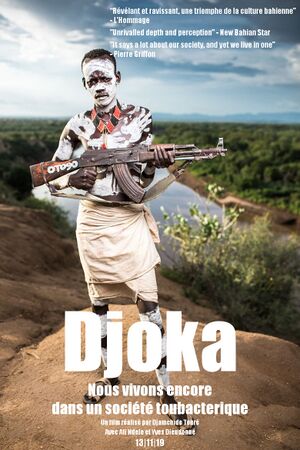Djoka (film): Difference between revisions
(Created page with "{{Infobox film | name = Djoka | image = Djoka poster.jpg | alt = | caption = The film's theatrical release poster | film_name = <!--...") |
No edit summary |
||
| Line 25: | Line 25: | ||
| gross = | | gross = | ||
}} | }} | ||
'''''Djoka''''' is a 2019 [[Gaullica|Gaullican]] {{wp|action film}} directed by acclaimed Mabifian-Gaullican director Djamchide Touré. The film, a modern adaptation of the famous {{wp|Mal du siècle|Aïibe ka Djâmanou}} novel of the same name by [[Ibrahim Barkindo]], is set in modern day [[Mabifia]]. It tells the story of an orphaned {{wp|Kikongo people|Bahoungana}} child ''(Ali Ndele)'', who takes up arms against a proposed mining development in his village. The film deals with the themes of identity and courage in the face of adversity, and was praised for its treatment of issues such as {{wp|Post-Traumatic Stress Disorder}} on {{wp|child soldiers}} and the [[ | '''''Djoka''''' is a 2019 [[Gaullica|Gaullican]] {{wp|action film}} directed by acclaimed Mabifian-Gaullican director Djamchide Touré. The film, a modern adaptation of the famous {{wp|Mal du siècle|Aïibe ka Djâmanou}} novel of the same name by [[Ibrahim Barkindo]], is set in modern day [[Mabifia]]. It tells the story of an orphaned {{wp|Kikongo people|Bahoungana}} child ''(Ali Ndele)'', who takes up arms against a proposed mining development in his village. The film deals with the themes of identity and courage in the face of adversity, and was praised for its treatment of issues such as {{wp|Post-Traumatic Stress Disorder}} on {{wp|child soldiers}} and the [[Toubacterie#Legacy|legacy]] of colonialism on Bahia. | ||
The film debuted at the [[Festival of Bahian and Diasporic Cinema]] at [[Verlois]], where it received strong reviews from the critics for its handling of Bahian issues. The film was highly successful critically, winning the top prize here and going on to win at the [[Montecara Film Festival]]. It also succeeded financially, leading at the box offices in most countries for several weeks after its launch. The film received some criticism in [[Euclea]] for its percieved "{{wp|common sense|anti-Euclean sentiments}}", which was amplified by the presence of [[Djeli pop]] artist [[Djeïne]] on the soundtrack. | The film debuted at the [[Festival of Bahian and Diasporic Cinema]] at [[Verlois]], where it received strong reviews from the critics for its handling of Bahian issues. The film was highly successful critically, winning the top prize here and going on to win at the [[Montecara Film Festival]]. It also succeeded financially, leading at the box offices in most countries for several weeks after its launch. The film received some criticism in [[Euclea]] for its percieved "{{wp|common sense|anti-Euclean sentiments}}", which was amplified by the presence of [[Djeli pop]] artist [[Djeïne]] on the soundtrack. | ||
Revision as of 14:03, 12 January 2020
| Djoka | |
|---|---|
 The film's theatrical release poster | |
| Directed by | Djamchide Touré |
| Starring | Ali Ndele Yves Dieudonné |
| Music by | Djeïne |
Production company | |
Release dates |
|
Running time | 160 Minutes |
| Countries | |
| Language | Gaullican |
Djoka is a 2019 Gaullican action film directed by acclaimed Mabifian-Gaullican director Djamchide Touré. The film, a modern adaptation of the famous Aïibe ka Djâmanou novel of the same name by Ibrahim Barkindo, is set in modern day Mabifia. It tells the story of an orphaned Bahoungana child (Ali Ndele), who takes up arms against a proposed mining development in his village. The film deals with the themes of identity and courage in the face of adversity, and was praised for its treatment of issues such as Post-Traumatic Stress Disorder on child soldiers and the legacy of colonialism on Bahia.
The film debuted at the Festival of Bahian and Diasporic Cinema at Verlois, where it received strong reviews from the critics for its handling of Bahian issues. The film was highly successful critically, winning the top prize here and going on to win at the Montecara Film Festival. It also succeeded financially, leading at the box offices in most countries for several weeks after its launch. The film received some criticism in Euclea for its percieved "anti-Euclean sentiments", which was amplified by the presence of Djeli pop artist Djeïne on the soundtrack.